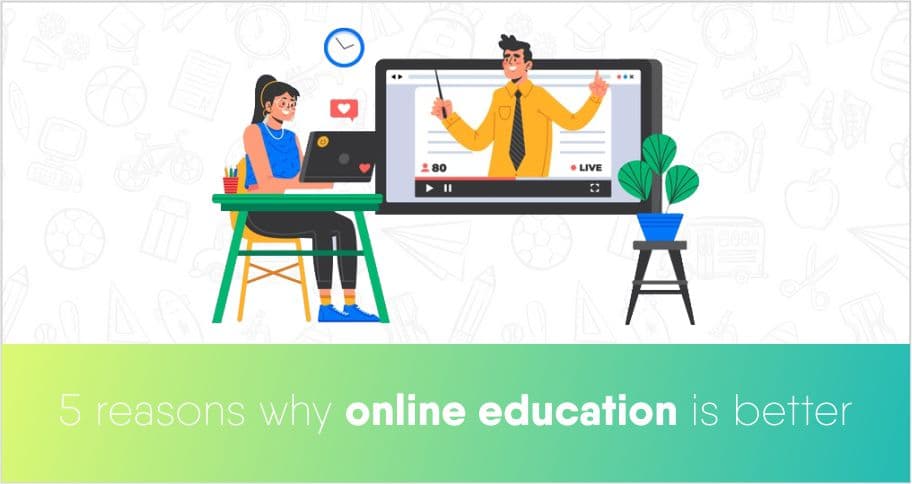5 reasons why online education is better
By orchidadmin |
Date 08-08-2024

Table of Contents
Admissions Open for
COVID-19 has increased at its own pace. The infliction of the virus has made lockdown necessary. And as the old saying goes, necessity is the mother of invention. The online learning industry is growing at an unprecedented rate ever since, with impetus from newer technologies.
Technology has acquired the center stage in all societies, and it is rightly called the fifth estate. Education has been affected by this phenomenon. Digital education has proven to be of utmost importance at this hour of need. A host of technologies have enabled online learning to become a reality, almost inevitable.
E-learning is an emerging platform with huge potential. The new-age technology of virtual reality can provide students with a live experience of learning. Simultaneously, cloud technology can store volumes of data, letting students organize their data and help teachers trace it. Learning is now a whole new experience with a completely transformed landscape.
Online education is also in accord with the technological determinism theory of Marshall McLuhan. The theory says that the medium is more important than the message. Apart from the message delivered, media technology has its own set of implications on the audience’s psychology—students in this particular case. Students are growing with the digital medium. Right from their games to their purchases, everything is over the internet. Then why not education?
Online learning has the potential to take education right down to the last mile. It should be seen as a new virtual environment where a student is left to learn things through participation. Rather than treating it as something new, we must provide due acceptance to a parallel virtual world that has become part of our lives. We use that world for communication, trade, security, and whatnot. Let learning has its share too.
Advantages of Online Education
E-learning advantages are paramount. The following are the five reasons which explain why online education is good and completely stands out from its traditional counterpart.
- Personalized—in terms of time, space, and content
In this new model of education, learners are at the center of things. Personalized online education advantages ensure that students are in complete control to decide what to learn, when to learn, and how to learn. Different students have varying needs on the verticals and horizontals of education. A relatively less sharp student can pause, rewind, and decrease the speed of lessons. Some other students may like to skip a particular part of the lesson as she may be well versed in the topic. The advantage of going multiple times through the lesson also rests in the student’s hand.
In this learning mode, students are well-positioned to give extra attention to topics they prioritize or the topics they are weak at. Online learning has made knowledge acquisition convenient like never before.
2. Learning through interaction
One of the most significant advantages of e-learning is that it is an interactive process. Interactivity can be built in terms of both content and structure of online learning. Multimedia 3d content engages the learner’s mind. She interacts with content at the psychological level.

At a more advanced level, virtual reality allows students to be immersed in unreal surroundings related to the subject of study with the help of headgears. Gamification is another mostly discussed concept where students have imparted knowledge in gaming surroundings. It is needless to say how fascinated students are by gaming characters. Learning through gamification could be fun for students.
On the structural side, online education involves the making of Google and WhatsApp groups. These are spaces for students to engage with their peers and, at the same time, acquaint themselves with these convenient modes of group communication. With virtual ecosystems taking to each and every walk of life, communication and coordination in virtual groups are no less critical than in physical groups.
3. The Multimedia Content
Content delivered in digital education is an amalgamation of text, audio, graphics, videos, etc. The greater acceptance of such content among students indicates it’s comprehensive character. Multimedia content has proved out to be extremely helpful in explaining the intricacies of scientific and economic models. It can give students a sneak-peek into the structure of atoms, working of the digestive system, or the trajectory of a projectile. It can simplify complex statistics and economic tables through graphics.

In a country like India, where a practical approach towards science is missing in most places, multimedia content can make it comprehensive to students through visual demonstrations.
Multimedia content is best suited for a generation that is more at home with visual content than simple textual or verbal information. Multimedia has an unmatched ability to retain an otherwise hurried viewer.
4. Learning At A Reduced Cost
One-time investment in ICT infrastructure can lead to steady pay off for years. Online learning can be used as both an alternative or supplement to traditional education, reducing costs substantially in each case. It’s unbound geographical reach along with its potential to engage a comparatively large number of students makes it an economically cheaper option.

As per the KPMG study, the online learning industry is expected to grow to 1.96 billion USD, with 9.6 million users compared to 247 million USD with 1.6 million users. The projected growth justifies the mushrooming of global platforms in this domain.
The reduction of cost in the digital mode of learning can be explained in terms of a handful of reasons. It almost eliminates travel costs. Digital education enables access to volumes of books and study materials at minimal or no cost. Cloud storage technology, now an integral part of the e-learning ecosystem, allows systematic storage of paperless books, assignments, materials, etc. reduces the cost of reading, so this is why online education is good, or we can say it makes the point over reading books.
The revenue model of digital education platforms is also supported by subscription fees from casual learners who otherwise might not have preferred to physically reach out to educational institutions for the same course.
However, it is a fact that digital education cannot be a complete replacement for traditional education at this point in time. A collaborative framework is required where both modes will add value to each other. Another reason why online education is good is that it promotes good learning.
5. Greener Ways To Learn
Until now, the offline mode of education has found its base on piles of books and notebooks. The large scale dependence on paper material puts a burden on the environment. Books and notebooks are no doubt one of the greatest assets we have, but they come at the cost of felling trees. A large number of trees are cut down every year to make paper.

The solution to this problem is inherent in the digital mode of education, which, by default, uses a soft copy of books and notebooks. This is perhaps the greatest advantage of digital education. E-learning, it must be said, is a green pathway towards education. There could be no monetary value to this advantage. Imagine the time taken by a single tree to grow up. Every tree saved is a great advantage.
In developed countries, many students go to school by their personal vehicles, thereby adding to the problem of carbon emissions. This trend can also be seen in metro cities in developing countries like India. Digital education could cut carbon emissions a great deal, leading to a green and clean society.
It is thus clear that online learning, once adopted to its full measure, has an automatic tendency to balance the environment.
Do you think there is still any scope of denial mode for online learning? There is none. There are challenges, of course, but we just need to tick the right boxes as the last mile is left.
This is why online education is good and is the first choice for many. What are you up to?
CBSE Schools In Popular Cities
- CBSE Schools in Bangalore
- CBSE Schools in Mumbai
- CBSE Schools in Pune
- CBSE Schools in Hyderabad
- CBSE Schools in Chennai
- CBSE Schools in Gurgaon
- CBSE Schools in Kolkata
- CBSE Schools in Indore
- CBSE Schools in Sonipat
- CBSE Schools in Delhi
- CBSE Schools in Rohtak
- CBSE Schools in Bhopal
- CBSE Schools in Aurangabad
- CBSE Schools in Jabalpur
- CBSE Schools in Jaipur
- CBSE Schools in Jodhpur
- CBSE Schools in Nagpur
- CBSE Schools in Ahmednagar
- CBSE School In Tumkur

Call Us to know more about Orchids
Swipe Up



.jpg&w=1920&q=80)












